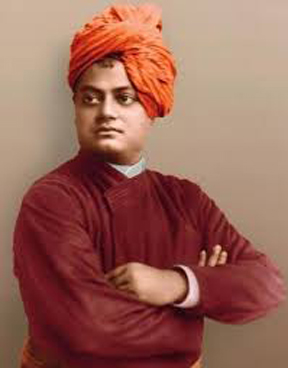 The Karmi (worker) renounces the fruits of his work. The Bhakta (devotee) renounces all little loves for the almighty and omnipresent love. The Yogi renounces his experiences, because his philosophy is that the whole Nature, although it is for the experience of the soul, at last brings him to know that he is not in Nature, but eternally separate from Nature.
The Karmi (worker) renounces the fruits of his work. The Bhakta (devotee) renounces all little loves for the almighty and omnipresent love. The Yogi renounces his experiences, because his philosophy is that the whole Nature, although it is for the experience of the soul, at last brings him to know that he is not in Nature, but eternally separate from Nature.
The Jnâni (philosopher) renounces everything, because his philosophy is that Nature never existed, neither in the past, nor present, nor will It in the future. The question of utility cannot be asked in these higher themes. It is very absurd to ask it; and even if it be asked, after a proper analysis, what do we find in this question of utility?
The ideal of happiness, that which brings man more happiness, is of greater utility to him than these higher things which do not improve his material conditions or bring him such great happiness. All the sciences are for this one end, to bring happiness to humanity; and that which brings the larger amount of happiness, man takes and gives up that which brings a lesser amount of happiness.
We have seen how happiness is either in the body, or in the mind, or in the Âtman. With animals, and in the lowest human beings who are very much like animals, happiness is all in the body. No man can eat with the same pleasure as a famished dog or a wolf; so in the dog and the wolf the happiness is entirely in the body.
In men we find a higher plane of happiness, that of thought; and in the Jnani there is the highest plane of happiness in the Self, the Atman. So to the philosopher this knowledge of the Self is of the highest utility, because it gives him the highest happiness possible.
Sense-gratifications or physical things cannot be of the highest utility to him, because he does not find in them the same pleasure that he finds in knowledge itself; and after all, knowledge is the one goal and is really the highest happiness that we know. All who work in ignorance are, as it were, the draught animals of the Devas. The word Deva is here used in the sense of a wise man.
All the people who work and toil and labor like machines do not really enjoy life, but it is the wise man who enjoys. A rich man buys a picture at a cost of a hundred thousand dollars perhaps, but it is the man who understands art that enjoys it; and if the rich man is without knowledge of art, it is useless to him, he is only the owner. All over the world, it is the wise man who enjoys the happiness of the world. The ignorant man never enjoys; he has to work for others unconsciously.
Thus far we have seen the theories of these Advaitist philosophers, how there is but one Atman; there cannot be two. We have seen how in the whole of this universe there is but One Existence; and that One Existence when seen through the senses is called the world, the world of matter.
When It is seen through the mind, It is called the world of thoughts and ideas; and when It is seen as it is, then It is the One Infinite Being. There is only One Existence, and that one is the Atman, the Self; and when this is perceived through the senses, through sense-imageries, It is called the body. When It is perceived through thought, It is called the mind. When It is perceived in Its own nature, It is the Atman, the One Only Existence.
Excerpted from an address delivered in New York, 1896. The 151st birth anniversary of Swami Vivekananda was celebrated on January 12.
Swami Vivekananda






